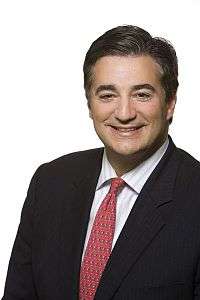Brian Darling
| Brian Darling | |
|---|---|
 | |
| Born |
1965 Andover, Massachusetts |
| Nationality | American |
| Education | J.D., New England School of Law |
| Occupation | Senior Fellow |
| Employer | The Heritage Foundation |
Brian Darling (born 1965 in Andover, Massachusetts) is a senior fellow in government studies at The Heritage Foundation, a conservative think-tank based in Washington, D.C.[1] Darling has been involved in U.S. politics since the early 1990s, in roles as a congressional aide, lobbyist and legal counsel. Darling came to national media attention when he resigned as legal counsel to Republican Senator Mel Martinez of Florida after admitting he was the author of the "Schiavo memo."
Early life and education
Darling grew up in Andover, Massachusetts and attended the University of Massachusetts Amherst, where he launched a conservative student publication, The Minuteman, with fellow student Tony Rudy. Darling received his Juris Doctor from the New England School of Law.[2]
Career
Darling joined the U.S. Congress as an aide to Idaho Senator Steve Symms in 1992. The following year, Darling worked for Georgia Senator Paul Coverdell.[2]
Darling became General Counsel to New Hampshire Senator Bob Smith in 1999. In January 2000, he and Senator Smith visited Cuban refugee Elián González before proposing legislation to grant González permanent residency. He was also a member of the Bush-Cheney recount team in Florida during the 2000 presidential election controversy and co-chairman of the Conservative Working Group, a weekly legislative strategy meeting of staffers from House and Senate offices.[3][4]
In 2003, Darling became a partner in the Alexander Strategy Group lobbying firm, where he advocated for gun rights and other issues. He was a chief strategist for Senate legislation permitting airline pilots to carry handguns on the job.[3][4]
In 2005, Darling became a legal counsel to Florida Senator Mel Martinez. He resigned from the position in May of that year following a controversy involving a strategy memo he had written based on the Terri Schiavo case. Later that year, Darling became director of United States Senate relations for The Heritage Foundation, where he is responsible for educating Senators and their staff about Heritage's latest research and policy recommendations.[2][1]
Darling began writing a regular column for Human Events in 2008.[5] He is also a contributor to the web sites RedState.com and BigGovernment.com.[6][7]
Schiavo memo
The Schiavo memo was a talking points memorandum on behalf of the Republican party, which described the ongoing Terri Schiavo case as "a great political issue" that could appeal to the party's base.[8]
Senator Martinez, who claimed not to have read the memo, had inadvertently passed it to Iowa Senator Tom Harkin, a Democratic supporter of the legislation to keep Schiavo alive.[9] National media outlets began reporting the existence of the memo shortly thereafter on March 18, 2005.[3] On April 6, 2005, Darling admitted to writing the memo and resigned his position as legal counsel to Martinez.[9]
Personal life
Darling and his wife currently reside with their daughters in Washington, D.C.[1]
References
- 1 2 3 "Brian Darling". The Heritage Foundation. Retrieved 15 May 2011.
- 1 2 3 McGonigle, Brian (15 November 2006). "Andover Native Becomes 'Darling' of Washington Conservatism". Boston University Washington News Service. Retrieved 18 May 2011.
- 1 2 3 "Martinez: Back in the Miami heat". The Hotline. 8 April 2005.
- 1 2 "Former Smith General Counsel Joins Alexander Strategy Group". National Journal’s CongressDaily. 16 January 2003.
- ↑ "Brian Darling". Human Events. Retrieved 15 May 2011.
- ↑ "Brian Darling". RedState. Retrieved 15 May 2011.
- ↑ "Brian Darling". BigGovernment. Retrieved 15 May 2011.
- ↑ "GOP memo says issue offers political rewards". Seattle Times. 5 April 2005. Retrieved 15 May 2011.]
- 1 2 Allen, Mike (7 April 2005). "Counsel to GOP Senator Wrote Memo On Schiavo". Washington Post. Retrieved 15 May 2011.
External links
- Brian Darling staff bio from The Heritage Foundation
- Appearances on C-SPAN